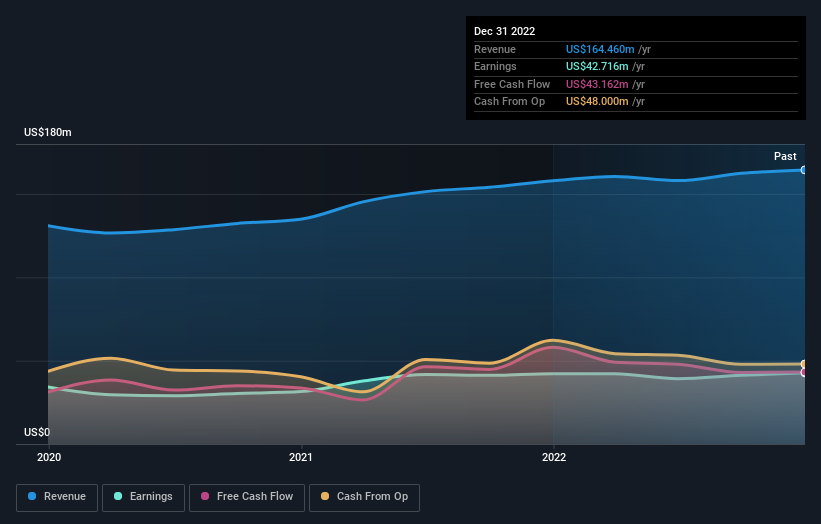- United States
- /
- Banks
- /
- NasdaqGS:EBTC
Enterprise Bancorp, Inc.'s (NASDAQ:EBTC) 11% loss last week hit both individual investors who own 48% as well as institutions
Key Insights
- Enterprise Bancorp's significant retail investors ownership suggests that the key decisions are influenced by shareholders from the larger public
- The top 25 shareholders own 44% of the company
- Recent purchases by insiders
To get a sense of who is truly in control of Enterprise Bancorp, Inc. (NASDAQ:EBTC), it is important to understand the ownership structure of the business. And the group that holds the biggest piece of the pie are retail investors with 48% ownership. In other words, the group stands to gain the most (or lose the most) from their investment into the company.
While institutions, who own 27% shares weren’t spared from last week’s US$47m market cap drop, retail investors as a group suffered the maximum losses
In the chart below, we zoom in on the different ownership groups of Enterprise Bancorp.
View our latest analysis for Enterprise Bancorp

What Does The Institutional Ownership Tell Us About Enterprise Bancorp?
Many institutions measure their performance against an index that approximates the local market. So they usually pay more attention to companies that are included in major indices.
Enterprise Bancorp already has institutions on the share registry. Indeed, they own a respectable stake in the company. This can indicate that the company has a certain degree of credibility in the investment community. However, it is best to be wary of relying on the supposed validation that comes with institutional investors. They too, get it wrong sometimes. When multiple institutions own a stock, there's always a risk that they are in a 'crowded trade'. When such a trade goes wrong, multiple parties may compete to sell stock fast. This risk is higher in a company without a history of growth. You can see Enterprise Bancorp's historic earnings and revenue below, but keep in mind there's always more to the story.

Hedge funds don't have many shares in Enterprise Bancorp. Kenneth Ansin is currently the largest shareholder, with 9.9% of shares outstanding. BlackRock, Inc. is the second largest shareholder owning 5.1% of common stock, and George Duncan holds about 3.5% of the company stock. George Duncan, who is the third-largest shareholder, also happens to hold the title of Chairman of the Board. Furthermore, CEO John Clancy is the owner of 1.5% of the company's shares.
A deeper look at our ownership data shows that the top 25 shareholders collectively hold less than half of the register, suggesting a large group of small holders where no single shareholder has a majority.
While studying institutional ownership for a company can add value to your research, it is also a good practice to research analyst recommendations to get a deeper understand of a stock's expected performance. We're not picking up on any analyst coverage of the stock at the moment, so the company is unlikely to be widely held.
Insider Ownership Of Enterprise Bancorp
The definition of company insiders can be subjective and does vary between jurisdictions. Our data reflects individual insiders, capturing board members at the very least. Company management run the business, but the CEO will answer to the board, even if he or she is a member of it.
I generally consider insider ownership to be a good thing. However, on some occasions it makes it more difficult for other shareholders to hold the board accountable for decisions.
It seems insiders own a significant proportion of Enterprise Bancorp, Inc.. Insiders have a US$95m stake in this US$382m business. It is great to see insiders so invested in the business. It might be worth checking if those insiders have been buying recently.
General Public Ownership
The general public, who are usually individual investors, hold a 48% stake in Enterprise Bancorp. This size of ownership, while considerable, may not be enough to change company policy if the decision is not in sync with other large shareholders.
Next Steps:
While it is well worth considering the different groups that own a company, there are other factors that are even more important.
I like to dive deeper into how a company has performed in the past. You can access this interactive graph of past earnings, revenue and cash flow, for free.
Of course, you might find a fantastic investment by looking elsewhere. So take a peek at this free list of interesting companies.
NB: Figures in this article are calculated using data from the last twelve months, which refer to the 12-month period ending on the last date of the month the financial statement is dated. This may not be consistent with full year annual report figures.
Valuation is complex, but we're here to simplify it.
Discover if Enterprise Bancorp might be undervalued or overvalued with our detailed analysis, featuring fair value estimates, potential risks, dividends, insider trades, and its financial condition.
Access Free AnalysisHave feedback on this article? Concerned about the content? Get in touch with us directly. Alternatively, email editorial-team (at) simplywallst.com.
This article by Simply Wall St is general in nature. We provide commentary based on historical data and analyst forecasts only using an unbiased methodology and our articles are not intended to be financial advice. It does not constitute a recommendation to buy or sell any stock, and does not take account of your objectives, or your financial situation. We aim to bring you long-term focused analysis driven by fundamental data. Note that our analysis may not factor in the latest price-sensitive company announcements or qualitative material. Simply Wall St has no position in any stocks mentioned.
About NasdaqGS:EBTC
Enterprise Bancorp
Operates as the holding company for Enterprise Bank and Trust Company that provides community focused commercial banking products and services.
Flawless balance sheet with solid track record and pays a dividend.
Similar Companies
Market Insights
Community Narratives



